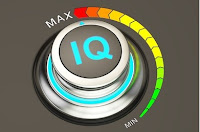What is Genius? Part II - Intelligence
Needless to say, intelligence has traditionally been a key component to the genius label. But do we really know what it means? In simplest terms, intelligence is the ability to acquire and apply knowledge and skills. It is not exactly smarts however, because smarts can be earned through learning while intelligence is innate.
How can we measure intelligence? Well, you must have heard of IQ tests. IQ stands for intelligence quotient, which is essentially a score for measuring how intelligent you are. There are many so-called tests on the Internet, but only two are internationally recognized: WAIS-IV and SB5. The one I took in 2021 was the WAIS-IV, placing me in the high end of the IQ spectrum. Contrary to conventional wisdom, these tests are more than just gauges of logical reasoning. The WAIS-IV has four components, which spans perceptual reasoning, verbal comprehension, working memory and processing speed. See here for an understanding of scores from commonly accepted tests.
Now that we have the basics out of the way, the question remains on the role intelligence plays in determining genius material. Lewis Terman tried to answer this question back in 1921. He conducted a longitudinal study of 1,528 gifted youngsters and followed them into adulthood. These "Termites" on average had an IQ of 135+ on the Standard-Binet test. Terman had a preconception that high IQ strongly correlates with one's success later in life. Hence he expected his sample group to go on to become Nobel laureates, heads of states or other renowned big shots. However, the results were quite disappointing. Many turned out to be good doctors and lawyers or led relatively successful lives by society's standards; but no Nobel winners. In fact, two non-qualified candidates due to insufficient IQ went on to win the Nobel.
The study did dispel myths about intelligent people being physically frail and displaying social awkwardness. In fact, many from his studies turned out to be more well built and socially adept than the average population. Terman also linked intelligence to heredity and concluded with some extreme propositions to "brighten" the population. But I digress...
The Termites showed us intelligence is not a sure-fire path to earthly success, never mind heavenly genius. Perhaps many can relate to this conclusion. There must had a been a bright kid who was the untouchable crown jewel in school, adored by everyone with a slight tinge of jealousy. In the last class reunion however, it turned out that the once school darling turned out to be an average Joe. I have a few friends from college who were probably more intelligent than me, but were content with living a less ambitious life and more on worldly pleasures. It seemed to me they have wasted their gift, but it is their decision and I respect it.
Regardless many agree that intelligence is a necessary ingredient for genius. They would also agree that it is not the only ingredient. Some people claim that as long as you are "intelligent enough," you will have a good shot at being successful in life. This usually means having an IQ somewhere in the 120's. But what is the magic number for a crack at genius? Not sure if anyone knows for sure, but 130+ (top 2% of the population) is my guess.
As intelligence alone cannot fully shape a genius, let's tune into the next factor that helps create one.
- PTS




Comments
Post a Comment